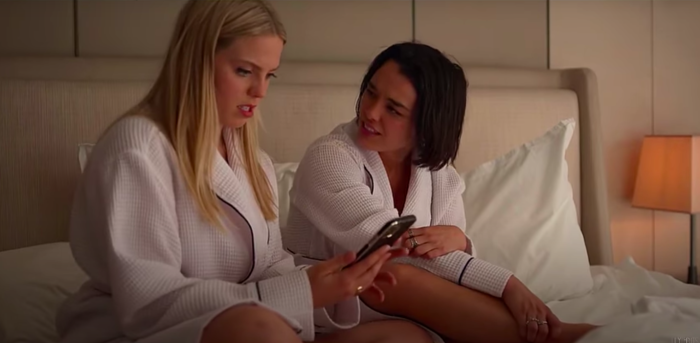The queer relationship between Leighton and Alicia on the show “The Sex Lives of College Girls” has been on my mind this month.
I’m struck by how aptly their breakup scene captures the painful feelings that often accompany dating a closeted person.
More on this later, but for now a brief summary:
The two girls meet through a group at the women’s center on campus. At first, Alicia writes Leighton off as just another cookie-cutter hetero sorority girl. At a frat party, she even yells to her, “You’re just this pretty blond straight girl!”—in response to which Leighton corrects her assumption by going in for a kiss.
They begin dating thereafter. Though their chemistry is undeniable, viewers also quickly note Leighton acting weird about the two of them spending time together, introducing Alicia to her friends, and all that—you know the trope by now.
Alicia continues seeing her though, perhaps hoping that Leighton just needs more time.
Things come to a head when the two girls go on an overnight retreat together and Alicia takes a selfie from their bed, which she then posts to her Instagram. When Leighton notices that her bag is visible in the shot, her lighthearted demeanor dissolves in an instant. She curtly demands that Alicia delete the picture immediately because anyone who sees it will know they’re dating.
Though incredulous and crestfallen in response, Alicia quietly does as she is asked. An hour later, she tells Leighton she thinks they should break up.
“I can’t go back into the closet with you,” she says, resolute but teary-eyed.
The scene got me right in the heart. A similar trope played out in last year’s “Happiest Season”—a movie that Keegan Williams described in the January 2022 issue of Out Front as “essentially Kristen Stewart’s character being emotionally abused, gaslit, and pushed back into the closet for 90 minutes because her partner’s parents are right-of-center.”
If I could bottle the feeling and hand it out I would—if only so that others could understand the unique pain of a situation that many a lesbian has unfortunately found herself in.
Watching the scene brought me back to my own freshman year college experience when my still somewhat closeted self (I had yet to come out to any of my hallmates) would take the train to see my girlfriend in Sacramento on the weekends.
While my hallmates met their hookups or significant others at frat parties, in the dorms, or after swapping study materials in class, I met mine through Downelink—a Myspace-esque LGBTQ social networking site (these were before the days of Tinder or Bumble or even OkCupid).
Similar to Leighton’s pre-Alicia hookups with older women from the dating apps, M was a few years older than me and looking for commitment. Spending Friday nights with her at the house of the boy she babysat provided what felt like a premature glimpse into domestic/married life, wherein we cooked together, read stories to the kid, then watched episodes of The L Word on the family’s big-screen TV after putting him to sleep.
When M came to spend time with me in Davis, like Leighton, I too introduced her as a friend—which hurt her at the time. Looking back, I regret the impact that my ambivalent feelings and need for peer acceptance had on another person. Later on, I would learn through firsthand experience how it felt to be in her shoes.
It didn’t take too long for my hesitant mindset to change though. Fast forward to a year later and I was not only comfortable with the lesbian label but wanted a committed relationship. Yet I seemed to keep finding myself on the opposite end of the dynamic to the one I’d been in before.
One woman, who wasn’t ready for any of her family or friends from back home to know about us, introduced me to her mom as a friend—despite the fact that I’d told my parents about our relationship and she’d even come to stay with me at their house one weekend, and despite the fact that most friends within our school community knew of us as a couple. To say it felt unbalanced would be a vast understatement. It felt like I was making her a part of my full life, while she was sequestering me to only a small corner of hers.
Months later, she was no more ready. The entire time we were together, she never did come out to her mom (though her mom read between the lines and figured it out anyway).
If I had to describe the pain of dating a closeted woman: picture moving from the wide-open world into a cramped cage. But your love’s in there, so you stay.
Your love’s in there, so you make it work.
You wave away the voices telling you you deserve more because those voices just don’t understand that love means sacrifice. It means meeting another where they’re at. It means giving up your idea of what you thought a relationship would look like and making peace with the imperfection of what it really is.
That was how I used to think.
It’s been said that part of empathy is the ability to meet a person exactly where they’re at. A question that I feel is important to ask when in this situation though: is the other person taking a step toward you?
I think the above wisdom applies when both people are attempting to meet in the middle—not when you’re the only one walking (backward, at that). Not when you’re dimming your light merely because the person you want still has yet to accept the full and unobstructed brightness of their own.
I stayed in several relationships and situationships for too long, hoping the person would change, or that my unconditional support would help them feel safer to come out. Maybe this happens in some cases; in mine, it never did. All that resulted was disappointment and feelings of deep unworthiness on my end.
I’m glad Alicia made the decision to walk away. Each person has their own journey, and no one deserves to be shamed for where they are at—but sometimes, two paths simply don’t align, and trying to forge them results in too much hurt for one person.
Many of us queer women who came out long ago have already been down that painful road, and we don’t want to walk it again. It was hard enough the first time. Life’s too short to spend waiting for a person to uncage their heart.
It’s too short to spend on standby for someone who may or may not ever be prepared to love us the way we deserve to be loved—fully, and out in the open.







Read 15 comments and reply